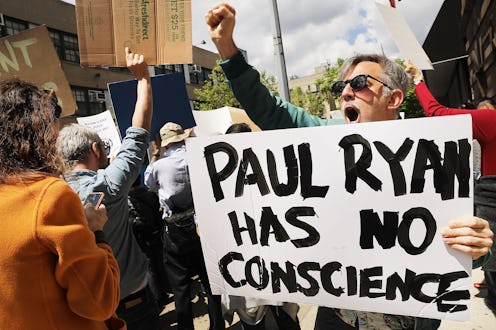News
For Adults With Autism, The AHCA Is A Matter Of "Life Or Death"

There are, sadly, a lot of people concerned about the potentially dire effects of repealing the Affordable Care Act. Ever since Republicans in the House of Representatives passed the American Health Care Act, there has been concern over how the law — should it be approved by the Senate and then signed by the president — would affect different communities, including the elderly, sexual assault victims, and the poor. But one of the groups not often talked about is the autism community — and the AHCA may negatively affect people with autism in some critical ways.
Under the ACA (also known as Obamacare), the federal government required that states cover any medically necessary autism treatment through Medicaid. That included coverage for treatment for people with autism up until age 21. Also, the definition of "medically necessary treatments" was left up to states to decide, and, therefore, allowed for some flexibility. However, this provision and guarantee of service was provided under Medicaid's Early and Periodic Screening, Diagnostic, and Treatment benefit, which is at risk of being stripped with Medicaid funding.
Shortly after the House passed the AHCA bill, the grassroots organization the Autism Society released an official statement expressing their concern over the bill:
The Autism Society of America, along with its many partners, are outraged by this vote. AHCA was not properly debated and was voted on without a Congressional Budget Score. Most importantly, this bill has deep cuts and restructuring which will decimate the Medicaid program – the lifeline for individuals with disabilities and their families. The bill allows loopholes that permit discrimination against people with pre-existing conditions. In addition, the American Health Care Act will cut Essential Health Benefits–such as rehabilitation services and mental health programs. The cuts will permit states to return to imposing lifetime caps on coverage and will not keep healthcare affordable for people with disabilities. Rather, this legislation would have devastating cuts of over $800 billion to Medicaid.
The threats on health care hit particularly close to home for Julia Bascom, the executive director of the nonprofit disability rights organization the Autistic Self Advocacy Network, which focuses on public policy advocacy and highlighting the voices of autistic people without speaking for them.
"That means hundreds of thousands of autistic people would go without the services we need every day. Some of us will be institutionalized as a result of those cuts. Others will die. The AHCA has dire, life-or-death consequences for our community."
Bascom tells Bustle over email about the ways cuts to Medicaid could drastically affect the quality of life for her community, and could even prove fatal.
"Autistic people and our families frequently rely on Medicaid-funded services to help us gain skills, go to school, work, and live in our homes. The proposed $880 billion in Medicaid cuts would decimate those services," says Bascom. "That means hundreds of thousands of autistic people would go without the services we need every day. Some of us will be institutionalized as a result of those cuts. Others will die. The AHCA has dire, life-or-death consequences for our community."
Bascom also raises concerns about what will happen to people with pre-existing conditions if the AHCA in its current form becomes law. While insurance companies will not be permitted to deny people coverage, they will be able to potentially charge higher premiums for people with pre-existing conditions whose coverage has lapsed for more than 63 days.
"Autism is by definition a pre-existing condition, and autistic people already struggle to access competent care," says Bascom. "If insurances companies are allowed to charge us more, refuse to cover autism-related health care needs, or drop entire categories of essential benefits like occupational therapy or mental health services, autistic people will suffer."
"We remember what health coverage was like for us before the Affordable Care Act. Medicaid cuts and a loss of basic insurance protections will return us to that same hellish dystopia."
One of the cultural factors that contributes to the lack of medical and social support for people with autism, according to Bascom, is the lack of recognition for adults with autism.
"Our culture still thinks of autism as a disability that mainly affects children," says Bascom, and adults with autism, like herself, are "barely a footnote in the cultural image of autism."
While the autism advocacy community is still working to overcome this issue and many others, the ACA was a move in the right direction. Memories of what life was like before the ACA are still very fresh, and the community is grappling with how to prepare for the possibility of Trumpcare becoming law.
"We've seen a lot of very valid concern from families that they could lose Medicaid services or that their autistic family members may lose health coverage," she says. "We remember what health coverage was like for us before the Affordable Care Act. Medicaid cuts and a loss of basic insurance protections will return us to that same hellish dystopia."